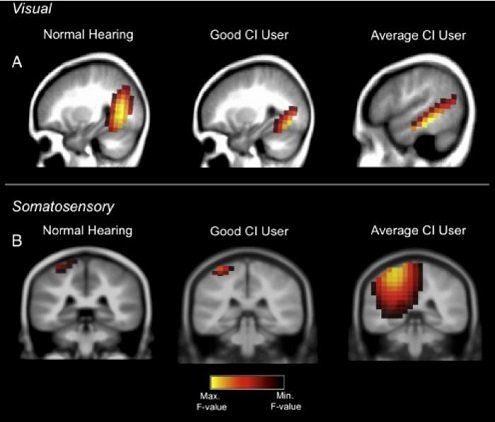Hearing Loss Studies
The Consequences of Untreated Hearing Loss
Many people are aware that their hearing has deteriorated but are reluctant to seek help. Perhaps they don’t want to acknowledge the problem, are embarrassed by what they see as a weakness, or believe that they can “get by” without using a hearing instrument. And, unfortunately, too many wait years, even decades, before getting treatment. READ MORE...

SILENTLY SUFFERING WITH HEARING LOSS NEGATIVELY AFFECTS QUALITY OF LIFE
According to a presentation at the American Psychological Association’s
123rd Annual Convention held August 6 – 9 in Toronto, Canada, many adults silently battle hearing loss, which is under treated despite evidence that hearing aid technology can significantly lessen depression and anxiety, and improve cognitive function. READ MORE....

How Does the Brain Respond to Hearing Loss?
Researchers exploring the ways in which the human brain responds to hearing loss have identified patterns of brain 'reorganization' that may be related to a widely reported link between age-related hearing loss and dementia. READ MORE....
Hearing Loss Linked to Accelerated Brain Tissue Loss
Although the brain becomes smaller with age, the shrinkage seems to be fast-tracked in older adults with hearing loss, according to the results of a study by researchers from Johns Hopkins and the National Institute on Aging. The findings add to a growing list of health consequences associated with hearing loss, including increased risk of dementia, falls, hospitalizations, and diminished physical and mental health overall. READ MORE...
One in Five Americans Age 12 and Older Experiences Hearing Loss Severe Enough to Hinder Communication
Nearly one in five Americans age 12 and older experience hearing loss severe enough to interfere with day-to-day communication.
The new research, published in the Archives of Internal Medicine, examined data from the National Health and Nutritional Examination Surveys, or NHNES, which has collected health information from thousands of Americans since 1971. The researchers looked specifically at people age 12 and older -- men and women of all races -- whose hearing had been tested during NHANES exams. READ MORE...
Quick Statistics Compiled by the National Institute on Deafness and Other Communication Disorders (NIDCD) READ MORE...
Statistics and Facts About Hearing Loss
Hearing loss affects 38 million people in the United States. Hearing loss can occur at birth or can develop at any age. There have been many advances in all aspects of hearing health care so that from the youngest infant to the eldest senior citizen, there are new and exciting options available to help. Treatment options vary depending on the degree or type of hearing loss, age of onset and individual lifestyle needs. If you suspect that you or a family member has a hearing loss, the best place to start is with a hearing evaluation by a licensed audiologist. READ MORE...
One in Five Americans Has Hearing Loss
New nationally representative estimate shows wide scope of problem.
Nearly a fifth of all Americans 12 years or older have hearing loss so severe that it may make communication difficult, according to a new study led by Johns Hopkins researchers and published in the Nov. 14 Archives of Internal Medicine. The findings, thought to be the first nationally representative estimate of hearing loss, suggest that many more people than previously thought are affected by this condition. READ MORE...


